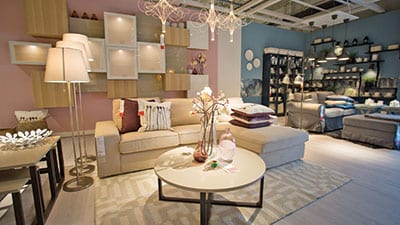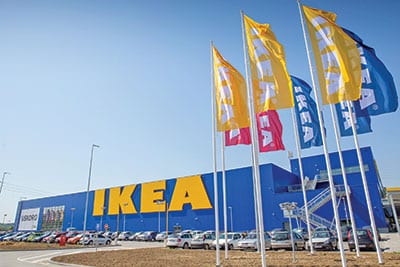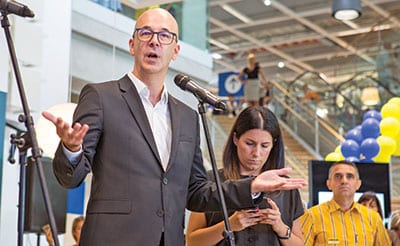We think the region has strong potential, and that our vision of “creating a better everyday life for many people” is even more relevant here than in well-developed countries, as IKEA sides with people with fewer means. As a result, every time IKEA enters a new market, interest in home furnishing grows.
Between the first opening of the small IKEA outlet in Belgrade in 1991, and the much larger one in August this year, Serbian consumers have waited 26 years. More than 16,000 people visited their favourite furniture shop the first day it opened, while about 20,000 registered for the family card that same day, promising a long love affair with IKEA. It is expected that IKEA will become a game-changer on the domestic market, both by driving up interest in home furnishings and in sending a strong signal to the domestic furniture industry in terms of design and efficiency.
IKEA is simultaneously a very welcome employer and, hopefully, the purchaser of Serbian furniture products in the future. We spoke with Stefan Vanoverbeke, CEO of IKEA Southeast Europe, about his first impressions following the opening of IKEA’s superstore, about the values the company brought to the Serbian market, and about the potential IKEA sees in the region.
The opening of the first IKEA Store in Serbia has received a significant amount of media interest, among other reasons because of the long process that culminated in its construction. What were the biggest obstacles on the journey from this project’s idea to its realisation?
We are aware that the IKEA fans in Serbia were anxious to be able to buy their favourite IKEA products as soon as possible, but it actually isn’t uncommon for an IKEA store to take several years to open! This timeline varies from market to market, and in Belgrade we experienced some setbacks with land acquisition and administrative procedures, but now we are here and planning to stay!
When you opened a small shop in Belgrade in 1991, four out of five visitors made a purchase. At the time, that was much higher than the global average. Compared to such results, how would you evaluate the first day of sales on 10th August?
Fantastic! The interest was huge and around 16,000 people visited us on the first day, with some of them waiting in line well before the store opened. At the end of the day, we also had almost 20,000 registered IKEA Family members, and this interest continues to be high after the opening weekend, and we are delighted that so many people in Serbia consider us as a good partner when it comes to their home furnishing needs, or just as a fun day out for the family.
You planned to hire 400 people, but you received a massive 25,000 applications? Was it easy to choose the right people? According to IKEA standards, how would you rate the educational and managerial qualities of your local employees?
The interest was huge and we are very lucky and grateful that so many people expressed a desire to work with us!

We do of course appreciate education and work experience, but we are primarily looking for the right personalities, people who share the same values as us, who can enjoy our working culture… and necessary skills can be acquired over time, and we are there to support them with the right set of training courses and professional development opportunities, and to enable them to grow.
Given the distance from Belgrade, do you primarily rely on the workforce resident in the surrounding settlements?
IKEA is an equal opportunity employer, and we recruit people primarily based on values to fit, while we disregard age, gender, nationality, marital status or place of origin. However, we do expect that people from our neighbourhood will consider us as a great place to work, and we would be happy to impact on the community in a positive way and to contribute to its economic development. Not only by creating new employment opportunities, but also by stimulating this area to transform into a vibrant commercial hub.
We are delighted that so many people in Serbia consider us as a good partner when it comes to their home furnishing needs, or just as a fun day out for the family
You started your career from the “bottom” and climbed your way to the top. You started pushing trolleys in Belgium, became a store manager in Italy, and then Country director for Poland! Has IKEA kept this approach of enabling employees to advance in their careers and will Serbian employees have the same kind of opportunity?
My career at IKEA has been long and exciting. Yes, I started as a storage co-worker. However, this would not be just my case – this actually happens a lot at IKEA. This only proves that IKEA is a great place to work. We are constantly striving to motivate our employees to realise their potential through numerous training courses and chances for career development.
Of course, the same opportunities will be provided for Serbian employees and any others who strive to learn and grow.
You are today IKEA’s CEO for the region of Southeast, where IKEA has big plans. What attracted you to this region and why do you think the potential exists here for 13 stores in the future?
I was looking for a new challenge within the IKEA Group, and there is always a special feeling of positive excitement and spirit when you start somewhere from scratch. There are, of course, many great things about working in a big and developed market, but there it is not possible to experience the joy of opening the first store, for example, or meeting the first customers on a new market!
 We think this region has strong potential. And that here our vision of “creating a better everyday life for many people” is even more relevant than in well-developed countries, given the limited purchasing power. There are three things that we will focus on in the period ahead: accessibility, affordability and employment. Our goal is to open new IKEA Stores in the region, in order to get closer to many people.
We think this region has strong potential. And that here our vision of “creating a better everyday life for many people” is even more relevant than in well-developed countries, given the limited purchasing power. There are three things that we will focus on in the period ahead: accessibility, affordability and employment. Our goal is to open new IKEA Stores in the region, in order to get closer to many people.
The second element is affordability, as there are many things which are important for customers, but affordability is essential. And, last but not least, there is putting together the right team to support these big plans. Essentially, our goal is to have happy employees and happy customers in Croatia, Romania, Serbia and Slovenia.
When it comes to the product range, does IKEA’s offer differ for smaller and well-developed markets; do you adjust it to local tastes and purchasing power? Will the range in Serbia be different compared to other markets?
Our range is pretty much the same in all stores across the globe, and the scope available mostly depends on the size of the store. During the design and production process, IKEA does not focus so much on the specifics of a market, but rather looks into what is common for many people worldwide. This enables the production of large volumes and subsequently lower costs that essentially mean lower prices for our customers.
What can differ from market to market is an inspiration and home furnishing solutions, and these are based on our insights into how people live in a certain area and what their home furnishing needs and priorities are like.
In Belgrade, these are living in a small space, smart storage, living with children, functional and easily maintained furniture and aspirations for modern style and light colours. Price is also an important factor in making a decision to purchase and that is why in Belgrade we especially invested in the lower price segment of the range to make these products even more affordable for our customers.
Serbia is the first country where IKEA opened online shopping along with its store from the first day. In the first four days alone we had more than 300 orders placed via the online shopping tool
What impact do you estimate the Belgrade store will have on the operations of other IKEA stores in the region?
We carefully plan our expansion steps in order not to cannibalise our existing stores, and in this case, that impact will be minimal.
One of the main complaints about IKEA in Serbia is that your range doesn’t carry local products. How many suppliers do you have, for example, in Hungary or Romania? How, if at all, do you stimulate local suppliers to join your supplier network and what are the main selection criteria?
IKEA is one brand and many companies. IKEA Serbia belongs to the IKEA Group, a home furnishing retail company and the largest user of the IKEA franchisee, owning and operating 352 stores worldwide. Our colleagues at the organisation IKEA Purchasing Services are in charge of cooperation with suppliers and them see great potential for this network to grow in Serbia and for more articles produced in Serbia to complement the existing few in our range, and to be sold not only in the Belgrade store, but in other stores as well.
To what extent will IKEA impact on the existing furniture market in Serbia, and do you think it will stimulate it to become stronger or weaker in the future?
Our experience with other countries tells us that this impact is positive.

What usually happens when IKEA enters a new market is that we come up with a unique offer, between design and functionality, and an affordable price. We change the rules of the game.
Generally, you can get either very good quality furniture at a very high price, or cheap furniture of questionable quality. But we have taken a different path from the start and sided with many people who have limited means. Every time IKEA enters a new market, the home furnishing interest grows, along with the furniture industry.
IKEA is a pioneer in many areas when comes to shopping. Do you see the potential in this market for online shopping?
Sure we do. We are aware that shopping habits are changing and that more and more people prefer to shop from the comfort of their home, and we are providing our customers with this opportunity. As a matter of fact, Serbia is the first country where IKEA opened online shopping along with its store from the first day. And the response from customers was great! In the first four days alone we had more than 300 orders placed via the online shopping tool.
Besides your retail outlet, you have also purchased additional land in Belgrade and are considering building a shopping centre. How would that shopping centre differ from others in Serbia, given that there are already quite a few, and some would say even too many, given the local purchasing power?
We are currently focusing on the Belgrade store and online sales. We do intend to commercially develop the area around the store, but we are still at the phase of considering the right model and timing, and I would say that it is a little too early to talk about specifics.